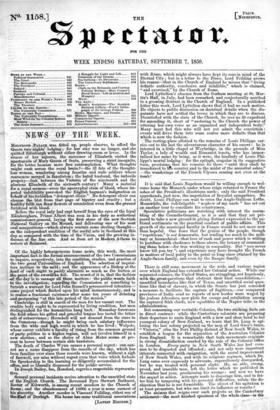Of the highly heterogeneous home news, this week, the most
important fact is the formal announcement of the two Commissions to inquire, respectively, into the condition, studies, and practice of the two great Universitiesof England. The selection of inquisi- tors inclines to the mild; and the appearance of a Bishop at the head of each ought to pacify alarmists as much as the button at the point of the swordbke foil The worst of it is, that the fashion of the day is to manage all these matters : the public wants faith in the investigation; regarding the Commission as something to furnish a warrant for Lord John Russell's preconceived intention— some project which flashed upon his mind instantaneously, and is to realize a fractional existence after some ten years of debating and postponing "at this late period of the session." Cambridge is still in search of the man for her vacant seat. The erudite body ought to be represented by living erudition, but men distinguished for the humanities hang back : Macaulay forswears the field where his gifted and graceful tongue has tasted the bitter salt of subservience ; Herschell will not descend from the stars to the Commons—though he might bring such salutary influences from the wide and high world in which he has lived ; Walpole, whose career exhibits a faculty of rising from the common ground of party politics to a higher region, will not involve himself in a new election ; and so the choice of Alma Mater seems at pre- sent to hover between certain able barristers.
The death of Charles Wynn causes a personal regret: one can- not see a name disappear from the records of the (lay, which has been familiar ever since those records were known, without a sigh of farewell, nor miss without regret even that voice which forbade the Speakership to the learning so diligently accumulated for the office' and so liberally dispensed for the public service.
In Joseph Bailey, too, Hereford, regrets a respectable representa- tive.
Several personal incidents revive attention to the unsettled state of the English Church. The Reverend Eyre Stewart Bathurst, Rector of Kibworth, is among recent seceders to the Church of Rome ; and the abandonment of 16001. a year is some earnest of his sincerity. Another seceder is Viscount Feilding, eldest son of the Zed of Denbigh. His house has some traditional associations with Rome, which might always have kept its sons in mind of the Eternal City ; but in a letter to the Times, Lord Fending avows his reason—that in the Church of England he misses that "living definite authority, conclusive and infallible," which is claimed, "and exercised," by the Church of Rome.
Lord Lyttelton's absence from the Gorham meeting at St. Mar- tin's Hall, in July, had been remarked, and conjecturally ascribed to a growing distrust in the Church of England. In a published letter this week,- Lord Lyttelton shows that it had no such motive. He objects to public discussion on doctrinal details when the dis- putants have not settled the terms in which they are to 'discuss. Dissatisfied with the state of the Church, he sees no fit expedient for amending it, short of "restoring to the Church the power of uttering her own voice as an organized and independent body." Many must feel this who will not yet admit the conviction : events will drive them into some course more definite than that which is now the fashion.
The resting-place allotted to the remains of Louis Philippe car- ries out to the last the adventurous character of his career : he is interred in a little chapel at Weybridge, in the grounds of Miss Taylor, a lady of wealth and Romanist tenets, who has immor- talized her name by being, as it were the landlady of Louis Phi- lippe's mortal lodging: for the epitaph, singular in its suggestive turn, proclaims that his remains lie there "until they shall be transferred to hts country and to the midst of the ancestral ashes," —the wanderings of the French Ulysses ceasing not even at the tomb !


























